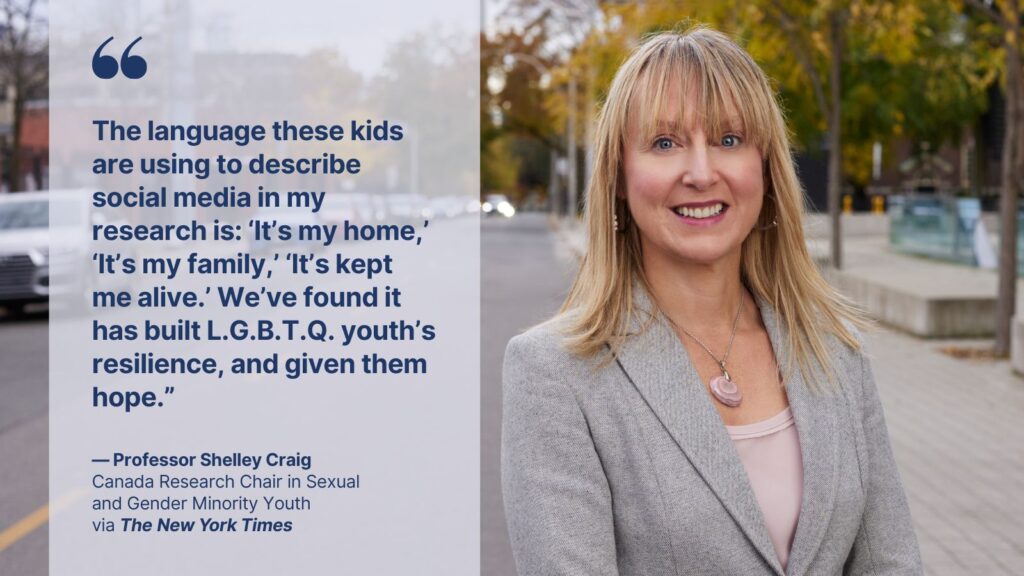Shelley Craig’s research on social media use among 2SLGBTQ+ youth featured in Maclean’s, Time magazine, and The New York Times
Categories: Faculty, Research, Shelley CraigThe risks associated with social media use among teens and youth has been well documented and discussed in recent weeks. In May, the surgeon general in the United States warned that platforms such as TikTok, instagram and Facebook could harm “the mental health and well-being of children and adolescents.” Meanwhile, Meta has issued new parental controls that permit guardians to monitor their teen’s use.
But the rush to protect youth from the real risks of social media use overlooks the fact that for some it’s the only place they feel safe to be themselves. That’s the finding of more than a decade of research by Dr. Shelley Craig, professor at the Factor-Inwentash Faculty of Social Work at the University of Toronto.
“Plenty of research, including mine, now shows that 2SLGBTQ+ youth use social media as a way to develop their identities and create relationships. Others use it to learn coping skills that help them deal with a world that can be fraught with rejection,” wrote Craig in an article for Maclean’s. “In the course of my studies, I saw over and over again that 2SLGBTQ+ youth seemed to be faring better in their day-to-day lives specifically because of their online activity, even when they were being mistreated at school or at home.”
Craig’s research, conducted through her international research lab, INQYR, has been covered in recent publications from The New York Times to Time magazine. It’s an important reminder that for some, social media is a lifeline. “We have found a reduction in suicides [among LGBTQ+ teenagers] with social media use, particularly for those that have a lot of risk factors offline, like potentially abusive parents or unsafe environments,” Craig told Time magazine.
The New York Times highlighted findings from Craig’s research that showed that “though data shows that the mental health of L.G.B.T.Q. teens is worse than that of straight teens, it can be improved by being online.”
As Clair Cain Miller wrote for The New York Times, “Her research has found that L.G.B.T.Q. youth find two things online that are known to reduce depression and suicidal thoughts: hope, and a sense of control over their actions and environment.”
Read the full articles, linked below:
Dr. Shelley Craig holds a Canada Research Chair in Sexual and Gender Minority Youth. Her research focuses on cultivating resilience in marginalized populations through innovative, community-based interventions. Craig created and leads INQYR, The International Partnership for Queer Youth Resilience, a SSHRC-funded interdisciplinary and multilingual international research partnership designed to understand and support the resilience of LGBTQIA2S+ youth through technology-engaged research.
Related:
- The New York Times highlights Shelley Craig’s research on the benefit of social media for LGBTQ youth
- The Social Work Speaks Out project is helping social work schools create more positive learning environments for LGBTQ+ students
- SAMHSA, a branch of the U.S. Department of Health and Human Services, features research by Shelley Craig in its latest resource guide
- Can video games and gaming communities enhance the wellbeing of LGBTQ+ youth? Researchers at the International Partnership for Queer Youth Resilience (INQYR) aim to find out
